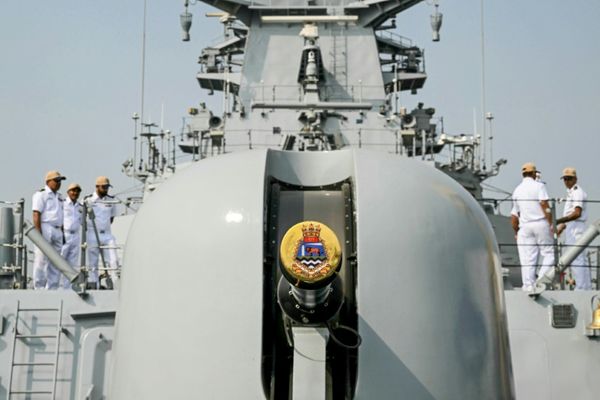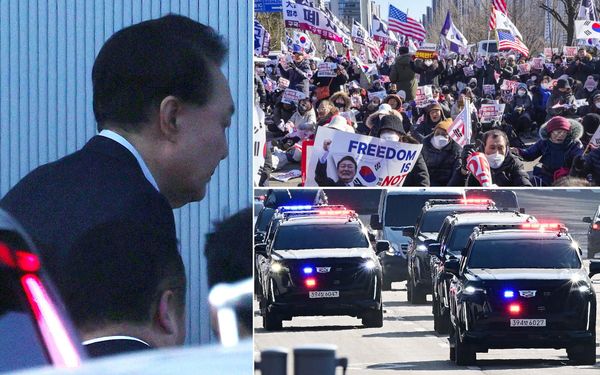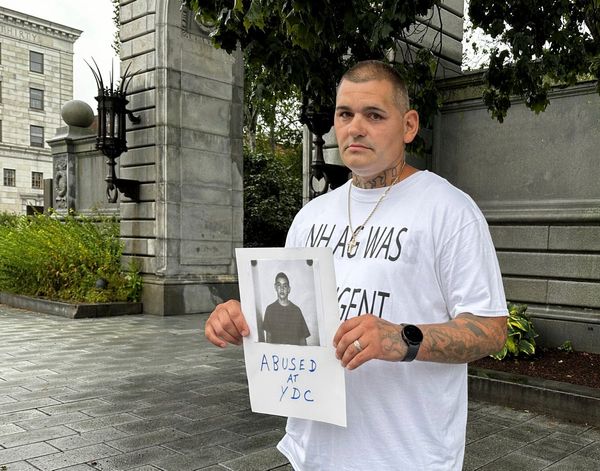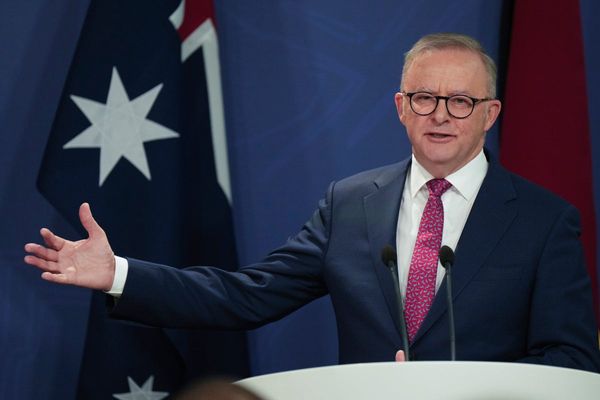
Russia’s goals in Syria were never altruistic. It wanted to preserve a military base in the Middle East to guard its regional interests, and it sought postwar reconstruction projects for its companies as a payoff for backing Syrian dictator Bashar al-Assad. Moscow has achieved the first goal, but the second is proving much more difficult.
Two diplomatic visions of Syrian reconstructions continue to clash. The West insists on linking reconstruction funds to a domestic political process deemed widely legitimate, the release of thousands of political prisoners, and guaranteed safety for all Syrians. Russia, for its part, wants to make reconstruction a precondition for the return of Syrian refugees. It has tried to sell the idea that the country’s 6 million-plus refugees will only be able to go back home if the West is willing to pay to rebuild Syria.
Last week, Russia tried to realize its vision for postwar Syria by helping organize the first international refugee return conference in Damascus. It failed miserably.
Around 20 countries including China, India, and the United Arab Emirates participated. But it quickly became apparent that they were only there either because they wished to gain from the reconstruction boom in Syria, not pay for it, or simply to display political support for Assad. Except for Lebanon, none of the countries hosting a sizable chunk of refugees was willing to accept Russia’s terms for dialogue.
The European Union refused to attend, releasing a statement describing the conference as “premature.” EU foreign-policy chief Josep Borrell added that even though everybody wanted the refugees to go back home, “these returns must be safe, voluntary, and dignified, in line with the parameters defined by the United Nations High Commissioner for Refugees.” The United Nations was present at the conference but only as an observer.
The conference’s thin participation enraged the Russians. Russia’s special envoy to Syria, Alexander Lavrentiev, was livid as reporters inquired why the attendance was far below expectations. “Pressure, pressure,” from the United States, he said to a Russian journalist at the event. Lavrentiev had courted Jordan just a few days before to reconsider its decision, but his efforts had not paid off.
Jordan, which hosts 650,000 Syrians who are often blamed for the country’s deteriorating economy, would be all too pleased to see them go home. Moreover, Amman desperately needs Moscow’s support to keep the Iranian militias present in southern Syria away from its borders. But Jordan is allied with the West and cannot be seen to be forcing the refugees to leave.
Russia understands Jordan’s predicament and sent Lavrentiev there on Oct. 27 to assuage its concerns. Lavrentiev went along with Ahmad al-Oudeh, a former rebel leader who is now the leading security provider to anti-regime Syrians in eastern Daraa near the Syria-Jordan border.
Oudeh is a familiar figure in the chaotic civil war with myriad local rebel groups and militias. He received assistance from the West and the United Arab Emirates at the Amman-based Military Operations Center during many years of the Syrian war. But in 2018, defeat seemed imminent and he agreed to a reconciliation deal mediated by the Russians. Oudeh’s pragmatism was rewarded when he was appointed commander of the 8th Brigade of the Moscow-backed 5th Corps in the Syrian Arab Army. His loyalty, however, is not to Assad but to anti-regime Syrians.
Two sources in Jordan confirmed to Foreign Policy that one of the reasons for Oudeh’s visit to Jordan was to pacify that country’s anxieties over the security threat the refugees might face if they returned. “Ahmad al-Oudeh went to Jordan to discuss the return of refugees,” said Abou Maher, a former rebel himself who was among those who signed the Daraa reconciliation agreement.
Russia is portraying the former rebel leaders who joined the 5th Corps as a safeguard for the safety of refugees upon return. But the idea is fraught with challenges. Since the reconciliation deal in Daraa promised peace for all sides in the war, the regime and the opposition have been relentlessly attacking each other, and the region has witnessed many assassinations. There is too much bad blood between Russia-backed former rebels and the Syrian army to reach any compromise that could possibly assure the refugees that they might escape random arrests, forced disappearances, and torture if they decided to return.
“Russians are trying to get the regime and our leaders to discuss refugee security,” added Abou Maher, the former rebel. “But no one must trust the regime’s intentions. They want to kill everyone.”
In 2019, a report by the Human Rights Watch said that Syrian intelligence branches had continued to arbitrary detain, disappear, and harass people. Abou Salem’s brother was among those who returned to Daraa that year. Soon after his return, as he made way for the city center, he was allegedly stopped by regime soldiers at a checkpoint, detained, and tortured in the local military intelligence branch. “They beat him so bad that there was no skin on parts of his body,” Abou Salem said. “He could not move for 10 days, I swear.”
These stories dent Russia’s image as a reliable policeman in Syria and deepen the Syrians’ fear of the regime that they accuse of committing systematic war crimes, now including the apprehension of those who thought it safe and returned. Neither Russia’s presumed sway over Assad nor its parallel army division made up of former rebels has managed to change the way the regime functions.
Jordan and its allies in the West have been made aware of the situation on the ground by intrepid human rights activists in Syria, Jordan, and Lebanon, often at personal risk. Darwish, one such Syrian activist, said he received death threats for being pro-West, while two of his colleagues were arrested and disappeared. He paid a smuggler $1,500 and fled to Lebanon just two years ago, then succeeded in bringing his family last month.
Darwish said that even though the economic situation in Lebanon is worsening, and poverty among refugees has risen by 90 percent in recent months, it is better than being in Syria. “Here at least the army won’t threaten and disappear me,” he told us from a Beirut suburb. “I stayed in Syria throughout the war, but when the army broke into my house to look for me, I knew what was coming.”
Lebanon participated in the conference. Its ruling elite has turned a deaf ear to refugees’ anxiety over random arrests, mandatory conscription in the army, and other privations inflicted by war. It has long held the view that the U.N.’s aid to Syrian refugees is slowing the return. Lebanon hosts 1.5 million Syrian refugees and, despite the government’s direct and indirect campaign to push them out, only 65,000 have so far returned.
Lebanon’s President Michel Aoun said the presence of refugees cost his country $40 billion, citing the International Monetary Fund, and suggested that international aid be provided to Syrians inside Syria, as that would “encourage them to return.”
Like Russia, Lebanon too expects to benefit from Syria’s impending reconstruction, which is expected to cost around $200 billion. It has been marketing its port in Tripoli in the north, just 20 miles from Syria, as the logistics hub for Syria’s reconstruction. But other than Lebanon, Russia has no sympathizers in the region.
Marianna Belenkaya, a Russian journalist who covered the conference, curiously noted Lavrentiev’s Turkey stopover right after the conference. “Russia had asked Damascus to invite Turkey,” she told me on the phone from the Syrian capital. “But Moscow understood why it couldn’t. Lavrentiev flew to Turkey to make sure they were not offended and to discuss refugee return.”
In Syria, Russian President Vladimir Putin is unable to seek any concessions from Assad that could persuade the West to back an international conference for refugee return, such as repealing mandatory conscription, releasing prisoners, and giving unhindered access to the U.N. High Commissioner for Refugees. But the other very important reason that many Syrians do not wish to return is the economic crisis in Syria. People don’t have enough to eat, their cities have been pulverized, and their homes are mere rubble in a vast wasteland.
Most countries have made it clear that they don’t want to legitimate Russia’s attempt to exploit the refugee issue for its own diplomatic and economic gain. But that’s not to suggest they have any plausible ideas of their own for reducing the suffering either of Syrians inside the country or those scattered elsewhere.







